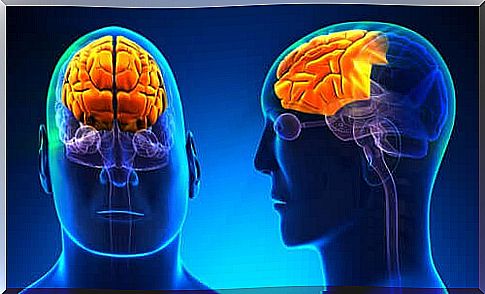Executive Intelligence: What Is It About?

When we talk about intelligence, the school context often comes to mind. That is to say a good student who gets high grades, a person who holds an academic degree or a scientist dedicated to research. But this way of understanding intelligence does not include all the typical dynamics of this cognitive mechanism. Today we talk about executive intelligence.
We know that there are multiple forms of intelligence and we perceive the latter as the ability to interpret information that comes to us from the outside world, include it in our inner world and give the best response to the conditions we face (executive intelligence).
Psychologists perceive intelligence as much more than just the IQ, identifying it with the individual’s ability to adapt to the environment in which he finds himself. Executive intelligence is the ability to know how to make decisions, to curb our impulses, to reflect on what we feel and what we think, to know how to plan our actions and to know how to direct our attention.
All of these skills represent important traits that together form executive intelligence. In this article we explain in a simple way what it is and also how to strengthen it.
Biological basis of executive intelligence: the frontal lobe (central executive)
First, we must point out that by looking for the biological basis of executive intelligence, we will most likely find the term executive functions. This is because executive intelligence has been studied separately, skill by skill or function by function, which is why scientific articles tend to talk about executive function rather than intelligence. However, the term executive intelligence is correct and refers to the use of all functions at the same time.
Studying this type of intelligence from a physiological point of view leads us to talk about the frontal lobe, and in particular the prefrontal cortex (center of impulse control and decision making). We could say that it is the frontal lobe that directs and governs the rest of the conscious functions of our brain.
And we know this because people affected by cerebrovascular accidents or, better said, who have suffered from stroke at the neuronal level of the frontal lobe, have different damages to their executive functions, or they lose them altogether.

The scientific literature counts on several documented cases on how a frontal lobe injury causes problems such as continuous distraction, the inability to plan normal daily life activities, remember what was being done and for what reason and, above all, the ability to brake the impulses. In this regard, the case of Phineas Cage (Ratiu, et al., 2004) is an example, in which a stroke had damaged a part of the frontal lobe. Phineas had stayed alive, but he had lost what made him most human: executive intelligence.
What skills make up executive intelligence?
Self-control and impulse management
Self-control is one of the main elements of executive intelligence. The frontal lobe (prefrontal cortex, near the eye sockets) has the task of regulating our behaviors, evaluating the possible consequences of our actions and therefore deciding what to do in each situation. In other words, the burden of education and cultural pressure falls on the frontal lobe and is part of executive intelligence. This is one possible hypothesis to explain why people with attention deficit hyperactivity disorder are treated with stimulants, which cause the frontal lobe to work harder.
The ability to modulate our behaviors is part of executive intelligence; knowing how to be silent at a given moment and being able to curb an impulse that could harm us if we let ourselves be carried away by it. This kind of intelligence goes hand in hand with the ability to know when to act and when it is best to “do nothing”.
In this way, executive intelligence is associated with the ability to control impulsivity and, therefore, working on self-control is a way to train this skill. For example, when you feel the urge to do something (buy an object, drink something or eat), the simple fact of stopping for a few seconds and asking yourself “what am I doing and why” can help a lot to train self-control and improve this. component of executive intelligence. In doing so, you will be able to exercise your self-control while working on improving executive intelligence.
Working memory
The concept of working memory was developed by Baddeley (1974) and, broadly speaking, refers to a process rather than a function of conservation of knowledge. Working memory is the type of memory we use to reason, to remember in the very short term, and it allows us to develop action plans and make decisions. We could say that it corresponds to the memory of the computer that we call processing unit or CPU. Working memory allows you to manage a certain amount of information and, at the same time, to process everything together to evaluate how to act, how we feel and what are the next steps to follow.
Why is working memory part of executive intelligence? Why does it allow us to relate different elements and, based on these, make a decision? Because it allows us to assimilate information, to reason and to come to a conclusion, absorbing information in a natural way. Following this, doing some calculations in your head can help strengthen your working memory.
Plan and make decisions
Part of executive intelligence is being able to make informed decisions in the shortest time possible. Smart decision making involves evaluating the pros and cons of each possibility, but at the same time it does so at a level that makes it optimal. A person with good executive intelligence knows how to decide and does it in a lucid way and in a short time.
The decision-making process that we implement starting from executive intelligence requires a great ability to imagine a scenario that goes beyond reality and to travel with the mind towards the different possible scenarios.
On the other hand, there is also the ability to plan, which is also part of executive intelligence. Develop plans and strategies to achieve goals through the planning component.
Being able to plan is a fundamental skill for several daily activities. In addition, it is necessary in different contexts such as study, job search, to become independent and start a family. In all these situations we make use of our executive intelligence and for this it is very useful to strengthen the ability to plan and create strategies.

Cognitive flexibility
A well-developed executive intelligence allows us to adapt our ideas to the changes we experience in our reality; in this sense, psychologists know that it is good to change your mind. This is a demonstration of cognitive flexibility, which allows us to adapt what we think and have planned to the circumstances of the moment. Being cognitively flexible also means enjoying a better ability to manage frustration, because thanks to this flexibility we are able to change the way we try to reach a goal without changing it.
At the same time, truly intelligent people at the executive level have a strong ability to adapt to obstacles and this thanks to their cognitive flexibility. In other words, if we have a plan and things do not go as we hoped, we will not change the goal, but the plan.
To have better cognitive flexibility and to strengthen our executive intelligence, we can practice something that leads us to leave our comfort zone: change path in our daily life, broaden our personal interests. The more different the stimuli our mind receives, the greater our flexibility.
Reasoning or abstract thinking and executive intelligence
This component of executive intelligence is perhaps the one that most distinguishes us as human beings. Thanks to it, we can think in abstract terms about “things” that do not exist in the physical world, but only in the mental or emotional one. We can also reflect on what we think (metacognition). Abstract reasoning allows us to work on our emotions, feelings, doubts and fears, as well as psychological aspects.
Executive intelligence also allows us to make sense of our life, which nourishes our mental health. Just the abstract reasoning helps us to understand that our existence has a value, pushing us to enjoy every minute we spend awake. Without this capacity for abstract reasoning, we would have an extremely pragmatic and meaningless life. On the other hand, to improve abstract reasoning we can train our ability to introspect, as well as study and read topics related to philosophy and art.
Finally, remember that executive intelligence is a different way of understanding intelligence in general. The main advantage of this approach is the training of different skills, which affects the quality of life. Put another way, executive intelligence is part of a new paradigm that focuses on improving the individual’s ability to adapt to the world around him. What are you waiting for to practice?









